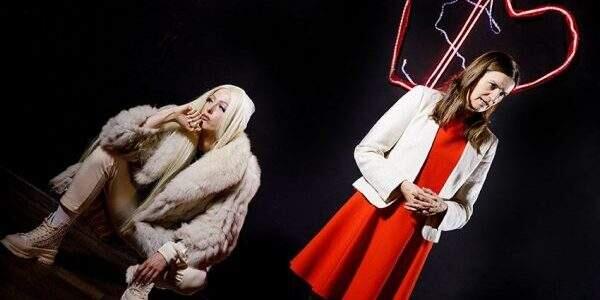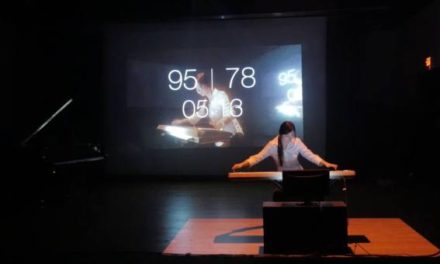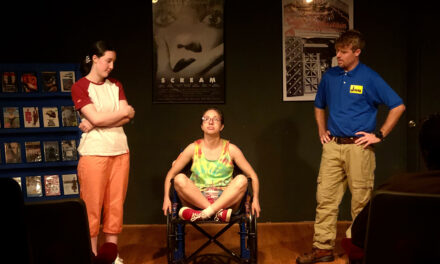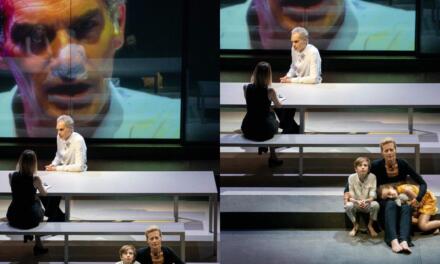Teatri ODA, Prishtina, 17th March 2022
Two actresses, both speaking in German, start talking about their national identity. They say they are Swiss and they question whether they have the right to play the roles of the two immigrant characters they were portraying in the play.
A huge phone dominates the minimalistic set. It keeps being moved by the performers, Susanne Abelein who plays the politician Ylfete Fanaj, and Julia Schmidt, who plays the famous rapper Loredana Zefi.
Jeton Neziraj’s play draws a comparison between Ylfete Fanaj, a successful politician in Switzerland, who was elected the first president of Lucerne Parliament in 2020, and the rapper Loredana. Both women are of Kosovo origin, both are now living in Switzerland.
The play’s spotlight is mostly shone on Loredana and the ‘scandal’ in which she and her brother were involved in 2019, when they were accused of threatening and extorting money from a Swiss couple.
In the play, Loredana and Ylfete seem to know each other quite well. They share a smoke together, and on the same morning that Ylfete is to be inaugurated in her new position, she and her husband talk about the latest news circulating about Loredana.
Sections of the rapper’s songs in German play in the background and the music abruptly stops every time the actresses start their dialogue. Having heard some of Loredana’s songs and seen photos of her all over the media, I expected her character to be more expressive, to be embellished with jewels, and wearing fancier attire. Director Katharina Cromme does not make such contrasts between the two characters in the physical sense – there are already many dichotomies in the dialogue between the two.
This layered dialogue is, to me, the strongest feature of the play, the way these conversations are not supplied in a linear fashion, like some people (me included) might expect. There are multiple tensions at play in the writing between realism and absurdism, fame and power, intellect and hard work, migration and homeland – the complex duality of human nature. It is fascinating how Neziraj continuously makes us explicitly aware of these dichotomies.
Yet, the play doesn’t only show these two sides, black and white, good and bad; it allows you to imply what lies between the lines – and yet we’re left desperately searching for some missing puzzle pieces to complete the whole picture.
There is much more about the play that deserves deeper scrutiny; it presents the world of “instagration“ as an active issue in today’s society, trying to follow the trends that you see on social media, trying to imitate the life of others, for others.
And there is this other world of true integration into society, which makes you think that truth dominates always and is worth fighting for. Integration in the way that Ylfete integrated. Be it in a country outside your homeland, a new workplace, a new friendship, real integration always takes time and effort, because we can feed, create, demolish, and then give re-birth to collective values and beliefs. And these do not always go in the direction of the truth.
Why aren’t there any Albanian actresses in Switzerland, the actresses ask the audience at the end of the play? But my mind keeps asking other questions. How did Ylfete come into the position of being the chairwoman of Lucerne’s parliament? Did Ylfete see her integration into the Swiss community as a primarily human, unbiased position by which people, through their work and dedication, contribute to the community where they live, no matter who they are and where it is? Does she deserve to be recognized and talked about more, by our media, by us?
Is Neziraj blurring the concept of nationality here? Because history has taught us, when nationality becomes the first and only self-identifier, people may cease to see clearly? Have things changed now? Can prejudices be eradicated and immigrants no longer seen as second-class persons who only do manual, low-status jobs? Or does this have more to do with our perception of ourselves and how willing we are to choose the hard way?
As the end of the play approached, the actresses let us know that, in fact, they are not Swiss after all, they are in fact German. But, does it really matter where they are from as long as they played their parts outstandingly and unraveled the well-thought-out layers of the play to us?
There was one moment where I wondered: what if Loredana created that scandal herself? To gain the spotlight, to gain our attention? After all, she did get a lot of the spotlight in Kosovan media. There were press conferences for Loredana, media portals talking about Loredana – now she’s even the subject of a play, and her music is all around us.
After the play, I went to a bakery to eat a burek and one of Loredana’s songs was playing.
And then I talked on the phone with one of my family members:
Them: Hey what’s up? What are you doing?
Me: I just got out of the theatre; I watched a play named King Lori!
Them: King Lear?
Me: No, no, King Lori!
Them: Aha, what does it mean?
Me: It’s the name of the album of this Albanian singer living in Zurich, Loredana (I googled her before the play).
Them: Aha, never heard of her!
And then I talked with someone else:
Hey, I watched a play about Loredana, the singer.
Really, they made a play about her? Why?
Oh, haven’t you heard about her latest scandal… Hmmm… What scandal?!
And so it goes, so it spreads.
(I did mention Ylfete as well, but they hadn’t heard about her – so I told them about her too).
I left the theatre thinking about the play and these new questions that awoke some sleeping side of me. What would happen to us if the idea of community never crossed our minds and if we only went to live life according to our rules, and our own set of behaviors and values? Aren’t we all subject to a constant calling to make the life of our own people better? To improve the lives of those who face discrimination? And isn’t this just what Ylfete is trying to do?
Credits:
Author: Jeton Neziraj
Director: Katharina Cromme
Costumes and music: Bebi Hartig SCM
Set design: Lucas Stucki.
Cast: Susanne Abelein, Julia Schmidt
Produced by Zürcher Institut für bewegende Künste in cooperation with Qendra Multimedia in Prishtina and Kleintheater Luzern
This article was originally posted to SEEstage.org on March 21, 2022, and has been reposted with permission. To read the original article, click here.
This post was written by the author in their personal capacity.The opinions expressed in this article are the author’s own and do not reflect the view of The Theatre Times, their staff or collaborators.
This post was written by Florida Kastrati.
The views expressed here belong to the author and do not necessarily reflect our views and opinions.


















